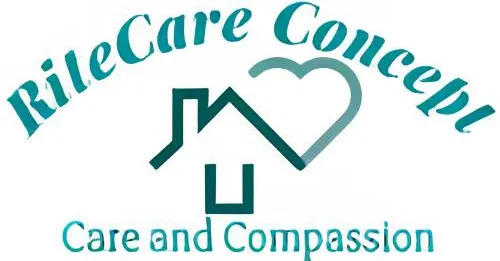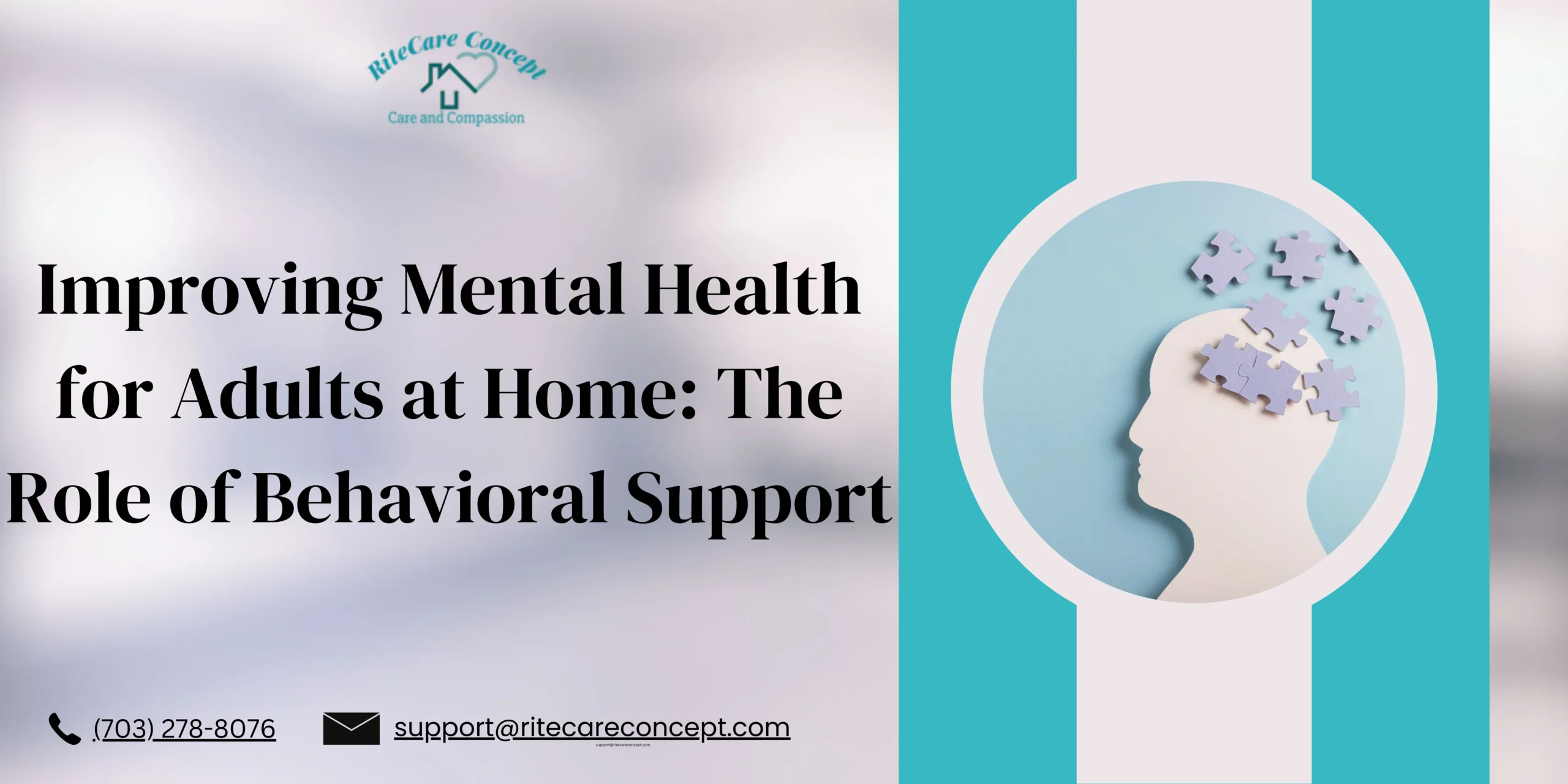For adults facing mental health challenges, having access to effective support systems within the home environment can make a significant difference in their well-being. Behavioral support for mental health focuses on building daily routines, managing stress, and developing behavioral health strategies that empower individuals to feel more grounded and fulfilled. At RiteCare Concept, we offer home-based mental health care services tailored to each individual’s needs, providing mental health support at home to help adults manage their mental health concerns in the comfort and security of their own environment.
In this guide, we’ll explore the benefits of behavioral support for mental health and how it contributes to improving mental well-being and a healthier, happier life.
Understanding Behavioral Support and Its Impact on Mental Health
Behavioral support is a form of mental health care that focuses on developing positive habits, emotional resilience, and coping skills. It empowers individuals to manage their mental health conditions and mental health challenges more effectively by providing structured support and encouragement. For many adults, behavioral health services address common concerns like anxiety, depression, chronic pain, and disorder PTSD, using evidence-based strategies that foster emotional stability.
This approach often involves collaboration with social workers, mental health professionals, and family members, ensuring a comprehensive care plan tailored to the individual. At RiteCare Concept, our home-based behavioral health care includes support for medication management, care coordination within the health system, and guidance to prevent frequent visits to the emergency room. The goal of behavioral support is to create a foundation for personal growth, stability, and improved physical and mental health in the long term.
Key Benefits of Behavioral Support for Mental Health at Home
1. Creating a Supportive, Comfortable Environment
Behavioral support delivered in a home setting provides individuals with the comfort of being in a familiar environment, which can reduce stress and enhance the effectiveness of the support. By incorporating mental health strategies into daily routines at home, individuals can develop new skills in a place where they feel safe and at ease.
Example: A behavioral support professional might guide clients in creating a morning routine that includes mindfulness exercises, reducing anxiety before the day begins.
2. Building Coping Mechanisms and Stress Management Skills
One of the primary benefits of behavioral support is helping individuals develop healthy coping mechanisms. Behavioral specialists work with clients to understand their stressors and teach techniques to manage stress, such as deep breathing, mindfulness, or progressive muscle relaxation. With consistent support, these techniques become valuable tools that help manage stress, reduce anxiety, and improve resilience.
Tip: Practicing simple techniques like deep breathing or grounding exercises during stressful moments can create a calming effect, making it easier to navigate challenges.
3. Enhancing Daily Routines for Structure and Stability
Creating structure is essential for mental well-being, as routines provide stability and reduce uncertainty. Behavioral support professionals help individuals design daily routines that encourage healthy habits, productivity, and self-care. This structure is especially helpful for those experiencing depression or low motivation, as it provides a clear path forward each day.
At RiteCare Concept, we emphasize the importance of routines in behavioral support, helping individuals develop routines that support their mental and emotional health.
Key Components of Effective Behavioral Support for Mental Health
1. Personalized Support Plans
Effective behavioral support is personalized to fit each individual’s needs, strengths, and preferences. Tailored support plans consider factors like work schedules, family responsibilities, and specific mental health goals, ensuring that strategies are practical and sustainable.
Example: A personalized support plan for an adult managing anxiety might include relaxation exercises, regular check-ins, and setting small, achievable goals for the week.
2. Skill-Building for Independence
Behavioral support focuses on teaching skills that individuals can use independently, promoting long-term mental health. Skills such as problem-solving, emotional regulation, and positive self-talk provide individuals with tools to manage their mental health in various situations, whether they’re facing stress at work or challenges at home.
Tip: Developing a set of “go-to” skills for managing stress or emotional distress can help individuals feel more in control and confident in handling difficult moments.
3. Encouragement and Accountability
Having someone to provide encouragement and check in regularly is invaluable for maintaining progress. Behavioral support professionals work closely with clients to celebrate small wins, hold them accountable to their goals, and provide guidance when challenges arise. This relationship fosters a sense of motivation and progress, which is essential for maintaining mental well-being.
How Behavioral Support Improves Overall Quality of Life
Behavioral support doesn’t just focus on managing symptoms; it aims to improve overall quality of life by encouraging individuals to engage in activities they enjoy, build positive relationships, and set meaningful goals. Here’s how behavioral support can enhance daily life for adults:
- Increased Confidence: Building coping skills and self-awareness fosters confidence, helping individuals face daily challenges with a positive outlook.
- Better Social Connections: Behavioral support often includes strategies for improving communication and social skills, enabling individuals to build stronger, healthier relationships.
- More Balanced Emotions: Through emotional regulation techniques, individuals learn to manage feelings of anger, sadness, or frustration, leading to a more balanced emotional life.
Example: By practicing gratitude or engaging in positive activities, individuals supported by behavioral care can experience an improved sense of joy and contentment.
The Role of Family in Supporting Behavioral Health at Home
Family members play a significant role in supporting mental health, and behavioral support often includes family guidance. Educating family members on how to encourage and respect boundaries allows for a supportive, compassionate environment that enhances mental wellness.
At RiteCare Concept, we work with families to ensure they have the tools to provide positive support without creating additional stress for their loved one.
Tip for Families: Offer praise and patience when supporting a loved one in their mental health journey. Encouraging small successes and offering help when needed can foster a supportive atmosphere.
Choosing RiteCare Concept for Behavioral Support at Home
At RiteCare Concept, we provide behavioral support that is compassionate, personalized, and results-oriented. Here’s what sets our approach apart:
- Customized Support Plans: We recognize that every individual’s mental health journey is unique, so we tailor our support plans to meet specific goals and preferences.
- Experienced Behavioral Specialists: Our team is trained in various behavioral support techniques, from stress management to emotional regulation, ensuring effective, professional support.
- Holistic Approach to Well-Being: We believe that mental health support should consider all aspects of a person’s life, fostering overall wellness and a positive home environment.
Our mission is to help individuals achieve mental wellness and enjoy fulfilling, empowered lives in the comfort of home.
Embracing Behavioral Support for Better Mental Health at Home
Improving mental health at home requires compassionate, structured support, and behavioral support for mental health is designed to provide just that. By incorporating these strategies into daily life, adults can experience greater emotional stability, a more positive outlook, and improved resilience.
If you or a loved one is seeking professional support to manage mental health from home, reach out to RiteCare Concept today. We’re here to help you build the confidence, skills, and structure you need to enjoy a healthier, happier life.

